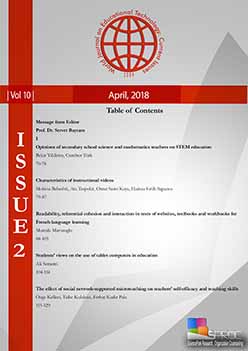The effect of social network-supported microteaching on teachers self-efficacy and teaching skills
The effect of social network-supported microteaching on teachers self-efficacy and teaching skills
Author(s): Ozge Kelleci, Taibe Kulaksiz, Ferhat Kadir PalaSubject(s): Education, Communication studies
Published by: Birlesik Dunya Yenilik Arastirma ve Yayincilik Merkezi
Keywords: Microteaching; social network-supported learning; teacher education;
Summary/Abstract: The three essential elements of an effective instructional environment are the students, the curriculum and the teacher. The teacher, on the other hand is the glue that combines these items. To train qualified teachers, it is important to use methods that employ theory and practice together in teacher education. In order for microteaching, one of these methods, to be more effective, supporting it with online environments such as social networks may be beneficial. In this respect, this study aims to find out the effects of Social Network-Supported Microteaching (SNSM) on self-efficacy and teaching skills of pre-service teachers. The study was conducted using mixed research model. The participants of the research are 17 pre-service teachers from the Department of Computer Education and Instructional Technology. Teacher Self-Efficacy Scale (TSES) and OpenEnded Interview Questionnaire (OEIQ) developed by researchers were used for data collection. The SNSM process took place in two stages. Pre-service teachers were asked to respond to Teacher Self-Efficacy Scale prior to SNSM, at the end of the firststage and subsequent to the SNSM. Following SNSM, through the open-ended interview questionnaire, opinions of the preservice teachers were received and the data on the effect of SNSM on teaching skills were collected. Following the collection of data, quantitative and qualitative data were analysed. Consequently, quantitative results indicated that SNSM increased teacher self-efficacy levels in terms of student engagement, classroom management and teaching methods. Qualitative data was in support of quantitative data, and pre-service teachers have expressly stated that SNSM has improved their teaching skills
Journal: World Journal on Educational Technology: Current Issues
- Issue Year: 10/2018
- Issue No: 2
- Page Range: 115-130
- Page Count: 16
- Language: English

